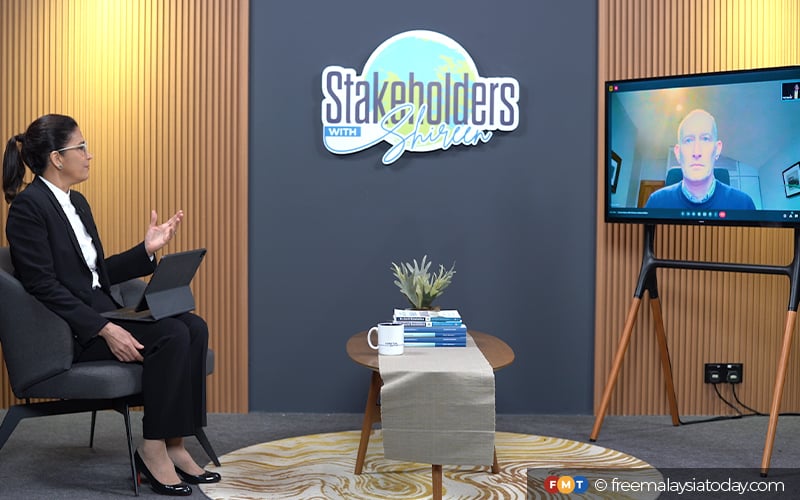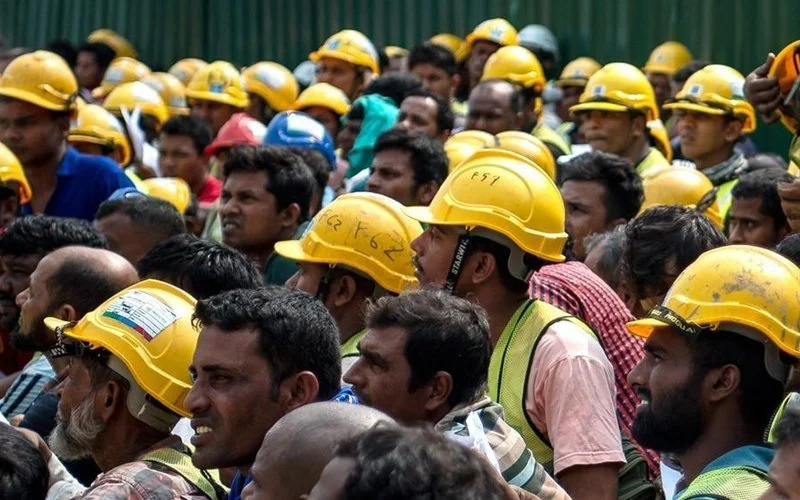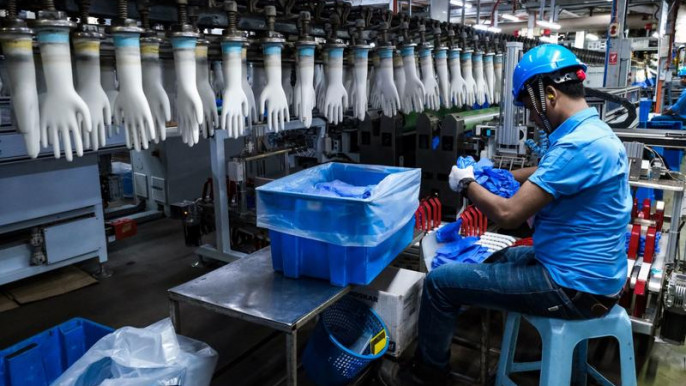FMT 1st Dec 2023: HR Minister Sivakumar refutes British slavery activist’s claim on ‘significant illicit industry’ of modern slavery in Malaysia
Human resources minister says he is not denying a problem of forced labour, just the alleged scale of modern slavery in Malaysia.
Original Article: FMT by Naveen Prabu – 30th November 2023
KUALA LUMPUR: Human resources minister V Sivakumar has recognised the issue of forced labour in Malaysia, saying he acknowledges the problem but doesn’t believe it is as extensive as claimed.
“I’m not saying there’s no forced labour, but I don’t think the number is that big,” Sivakumar said.
His remarks came in response to assertions by UK-based activist Andrew Wallis, who claimed that modern slavery exists as a “significant illicit industry” within Malaysia.
Minister’s response to forced labour claim a ‘red flag’, says Santiago
The former Klang MP says human resources minister V Sivakumar’s response dismisses the scale of the issue of forced labour in Malaysia.
Original Source: FMT by FMT Reporters – 1st December 2023
Wallis also said there may be as many as 212,000 victims in the country at any given time.
While Sivakumar said he was sceptical about the extent of the issue, he did not deny its presence.
The minister also said the government is committed to taking strong action against employers found to be involved in forced labour.
“We are prepared to take severe action if at all any of our employers are using forced labour,” he said.
Sivakumar also said that the definition of forced labour encompasses a “wide” range of circumstances.
“Even if they (employers) don’t pay the salary, that can also be considered forced labour.
“We are ever ready to solve this problem,” he said.
FMT 30th Nov 2023: Modern slavery a ‘significant illicit industry’ in Malaysia, says activist
Andrew Wallis says corruption and inadequate labour law enforcement are among the main contributors to the prevalence of modern slavery.
Original Article: FMT by Tan Chin Tung – 30th November 2023


Migrant labour rights activist Andrew Wallis says there are 212,000 victims of modern slavery in Malaysia at any given time.(Bernama pic)
PETALING JAYA: A renowned UK-based activist has branded modern slavery a “significant illicit industry” in Malaysia, citing estimates showing there are some 212,000 victims of modern slavery in the country at any given time.
Andrew Wallis, founder of migrant labour rights NGO Unseen, also said the modern slavery trade generates profits approaching US$500 billion per annum.
“The problem is pervasive, and it affects various sectors,” he said on the latest episode of FMT’s talk show, Stakeholders, with Shireen.
“We know there are problems in the electronics, agriculture, construction, and medical glove manufacturing industries.”
“Modern slavery” refers to the exploitation of people for personal or commercial gain, and occurs through the use of violence, threats, coercion, deception or abuse of power. It is considered a violation of human rights and dignity.
Human trafficking, forced labour, debt bondage, forced marriage, commercial sexual exploitation, and child labour are common examples of modern slavery.
Asked what contributes to the problem, Wallis, one of the catalysts behind UK’s Modern Slavery Act 2015, said corruption, inadequate labour law enforcement, a large migratory workforce and poverty all play a significant role.
In Malaysia, he said a lack of awareness, an inadequate legal framework and insufficient resources are the biggest obstacles to combating the problem.
However, he acknowledged that the Malaysian government has been taking steps to address the issue by focusing on efforts to reduce human trafficking and forced labour violations.On the latest episode of FMT’s talk show, Stakeholders with Shireen, anti-slavery proponent Andrew Wallis says a lack of awareness, an inadequate legal framework and insufficient resources are the biggest obstacles to combating the issue of modern slavery.
“I’m delighted that we’re covering this subject,” Wallis told host Shireen Muhiudeen.
“It’s really important that people are aware that it is going on. You can’t tackle something unless you know precisely how it’s taken place.”
Wallis said that in 2021, the UK government came under fire for purchasing medical gloves from Malaysian manufacturers for the National Health Service despite the US imposing sanctions following allegations of the use of force or indentured labour in their manufacture.
That saw a lawsuit, which the UK government settled out of court, and resulted in the enactment by its parliament of the Health and Care Act 2022 aimed at eliminating the importation of goods manufactured through the use of forced labour.
“So, we’ve gone from this voluntary matrix to (a) legal framework,” he said. Andrew Wallis.
Wallis also said most migrant workers arrive in Malaysia in significant debt, placing them in a position of vulnerability.
He said although many of the issues migrant workers face occur in their home countries, it is the responsibility of the companies seeking to employ them to ensure compliance by suppliers of their workforce.
That means companies must agree to pay to bring those workers into Malaysia and adhere to the principles of fair recruitment and decent work set by the International Labour Organization to eliminate exploitation, said Wallis.
Ultimately, he said, it is the reputation of the company and its brand name which are at stake and “get the media focus” when issues of modern slavery within its workforce arise.
FMT 30th Nov 2023: Malaysia must boost laws against modern slavery, says UK-based activist
Anti-slavery proponent Andrew Wallis says NGOs play an important role in turning victims into ‘resilient individuals who are no longer vulnerable to exploitation’.
Original Source: FMT by Tan Chin Tung – 30th November 2023

Anti-slavery proponent Andrew Wallis says Malaysian businesses need to be aware of stricter legislation in major export markets introduced to tackle the issue of modern slavery. (Andrew Wallis Facebook pic)
PETALING JAYA: A UK-based activist has called on Malaysia to take urgent measures to eradicate modern slavery by strengthening the country’s labour laws.
“We have to recognise that this is one of the most heinous crimes that can be committed against another human being,” Andrew Wallis said on FMT’s talk show, Stakeholders, with Shireen.
He said Putrajaya should “upgrade” its legislation, an important step being taken by many countries worldwide.
“The UK, US and EU (European Union) are taking measures to tackle human trafficking and improve working conditions. That is something the Malaysian government can think about doing as well,” he told host Shireen Muhiudeen.
In Malaysia, Article 6 of the Federal Constitution provides that no person may be held in slavery. Forced labour is a criminal offence under the Anti-Trafficking in Persons and Anti-Smuggling of Migrants Act 2007, and Section 374 of the Penal Code.
Wallis said Malaysian businesses also need to be aware of stricter legislation in major export markets introduced to tackle the problem.
He gave the example of the “withhold release” imposed by the US Customs and Border Protection on products suspected of being tainted by forced labour practices.
Meanwhile, the UK parliament has passed the Modern Slavery Act 2015 and, more recently, the Health and Care Act 2022, to eliminate the use of goods manufactured with the use of forced labour.
Wallis said the EU likewise requires compliance with several human rights due diligence laws and a Tariff Act tied to forced labour.
“This is pertinent to Malaysia because what the Tariff Act says is that if goods can be proved (to be) tainted by forced slavery, then you won’t have access to the EU market,” he said.
Wallis suggested that in tandem with enacting tighter legislation, the government should also take steps to ensure that Malaysian companies adhere to the best practices and principles drawn up by the International Labour Organization.
“If you treat your workers well and you look after them well, your quality assurance and productivity will be improved, so that actually is a ‘win-win-win’ for business just by doing the right thing,” he said.
Supporting the victims
Describing forcing a person to work against their will as a “heinous crime” comparable to murder, Wallis also stressed the importance of victim support.
“We need to ensure that people have access to medical care, accommodation and legal support in their primary language.
“They may need financial support, and that’s particularly pertinent when they have arrived in a country with a significant amount of debt,” he said.
Asked who employers can look to for assistance in victim support, Wallis said that NGOs were a good starting point.
He said these organisations can offer victims of modern slavery the necessary support to turn them into “resilient individuals who are no longer vulnerable to exploitation”.
Wallis said NGOs also play an important role in allowing victims access to law enforcement since many of them lack trust in the police force.
“These victims don’t know how to access the legal framework, and so we work alongside them and allow justice to be facilitated. We understand their plight and their needs, and then ensure that if they want to, it is safe for them to go home,” Wallis said.
Formed in 2008, Wallis’s charity organisation Unseen offers safehouses and community support for survivors of trafficking and modern slavery, and runs a 24/7 hotline.
It also provides consultancy services in the field, raises awareness, and engages with stakeholders to influence legislation, improve practices and increase collaboration to end modern slavery.
Additional Reading:
See more: 20th Oct 2023 Malaysiakini: Long-awaited foreign worker management report declassified in Malaysia
See more: 19th Oct 2023: Malaysia facing huge excess of 1/4 million migrant laborers
See more: 2nd Oct 2023: Exploitation of migrant workers continues unabated in Malaysia


